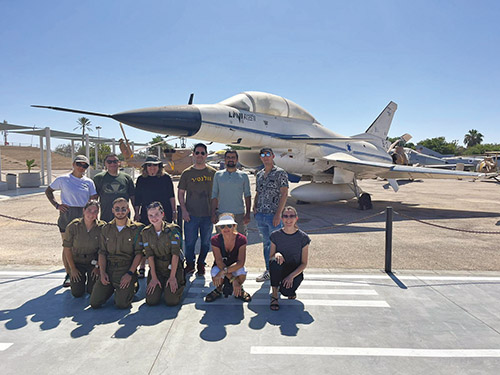






On a recent trip to Israel, I had the good fortune to volunteer with Sar-El on an IDF army base. I am certain that many readers have not heard of Sar-El, and I am writing this article to inform and motivate others to get involved and volunteer with the organization.
Sar-El was created in 1982 when, as a result of the war in Lebanon, volunteers were needed to fill the void in agriculture created when so many of the regular workers were called up to serve. Over the years, Sar El has evolved and found niches in the IDF where volunteers are utilized to fill gaps in the labor force as well as enable soldiers and reservists to spend more time securing Eretz Yisrael.
This trip was my third time as a Sar-El volunteer; many people have performed this volunteer service more than 30 times. Volunteers are stationed for either one, two or three weeks at a variety of bases around the country based on IDF need or personal preference. This time I was placed in a small group of eight volunteers at a logistics unit base in the Negev that is responsible for transporting tanks and other heavy equipment during times of war and emergencies. Its proximity to the recent Gaza escalation added greater significance to some of the apparently mundane tasks we performed, such as sorting and painting various truck parts, cleaning warehouses and organizing other equipment. It was all for the purpose of being in a state of readiness.
Little did we know that only two days after our stint ended on Aug. 4, over 1,000 projectiles would be launched from Gaza into Israel. Although a land incursion by the IDF was neither required nor practical, it was rewarding to know that some of our efforts would have been helpful in facilitating such a response to the assault. Many of the Israeli soldiers, commanders and civilians who we worked with live extremely close to Gaza in communities such as Sderot, Ofakim, Netivot and various moshavim in the area. I empathized with them and could only imagine the chaos they faced when their warning alerts went off and they had to scramble to safety in their shelters amid the barrage of missiles.
Sar-El volunteers sleep in a dormitory style setting, with men and women segregated. Yes to air-conditioning; yes to a washing machine; no to maid service. The food was not your typical army rations, but more like a smorgasbord at a bar mitzvah. The main meal, lunch, had as many as 10 different salads, at least two choices of a meat dish, and a few different carb options. There were always vegetarian options. Breakfasts and dinners were not quite as elaborate, usually consisting of eggs, French toast, pizza, vegetables, fruit, cheeses, etc. The fee for all of this was very reasonable, $0, or in shekels, 0 shekels. The food is always kosher.
We worked from Sunday through Thursday afternoon, when we were driven to a major transportation hub in Tel Aviv so we could proceed with our Shabbat/weekend plans off the base. Some people like myself went to visit family for Shabbat and others went around the country exploring. We had to gather at a specific meeting place on the following Sunday morning. The madrichim were very concerned that each volunteer had a place to stay and also knew how to go and return to the meeting place. They always wanted to make sure that we were happy campers…I mean volunteers. I especially appreciated madrich Assaf, who arranged an escort for me to go to shul on the base and even brought back breakfast for me. Every base has a shul and the madrichim are very helpful for those of us who want to daven with a minyan. The soldiers enjoyed it very much when “us” volunteers joined their minyanim.
The best part of volunteering was getting to know the soldiers and the other volunteers from all over the world. The soldiers were personable, caring and appreciative of our work. The volunteers were very diverse. There were many participants who were teachers, college students, engineers, doctors, grandparents/grandchild combos, and of course, retired folk. It was the seventh time that Joel, from Toronto and 86 years old, was volunteering. Lolly, also a youthful 89, was a newcomer to Sar-El.
One of the commanders mentioned that our presence boosted the morale of the soldiers. Let’s face it, our logistics unit was not as glorious as Golani or Givati, and many of the soldiers in our unit came from socioeconomically disadvantaged backgrounds. The presence of volunteers from abroad, having spent money on flights and using up our vacation time to support them and the IDF, was very uplifting to the soldiers and their morale. The camaraderie forged between us was meaningful and gratifying.
A realization that was quite surprising to me was that such a large number of volunteers in this Sar-El session were non-Jews. Their rationale was either their pro-Israel attitudes or the desire for a new adventure in Israel. They support Israel as the Jewish homeland and are spending their money and vacation time volunteering with the IDF, just like many of us Jews. A fellow Jewish participant mentioned something very worthy to consider. She pointed out that these non-Jewish volunteers are sweating and often performing very strenuous tasks during their vacations, and she wondered why there were not more Jewish participants. We determined that we Sar-El alumni needed to get the information out to our respective communities about volunteering and using vacation time in this most productive manner.
The feeling of achdut shared among the various participants is palpable and friendships are made which will continue for years. It is my hope that in reading this article more people will consider participating in the Sar-El program. It is a life-altering experience. For more information, visit the Sar-El website at www.sar-el.org.
By Chaim Stricker












